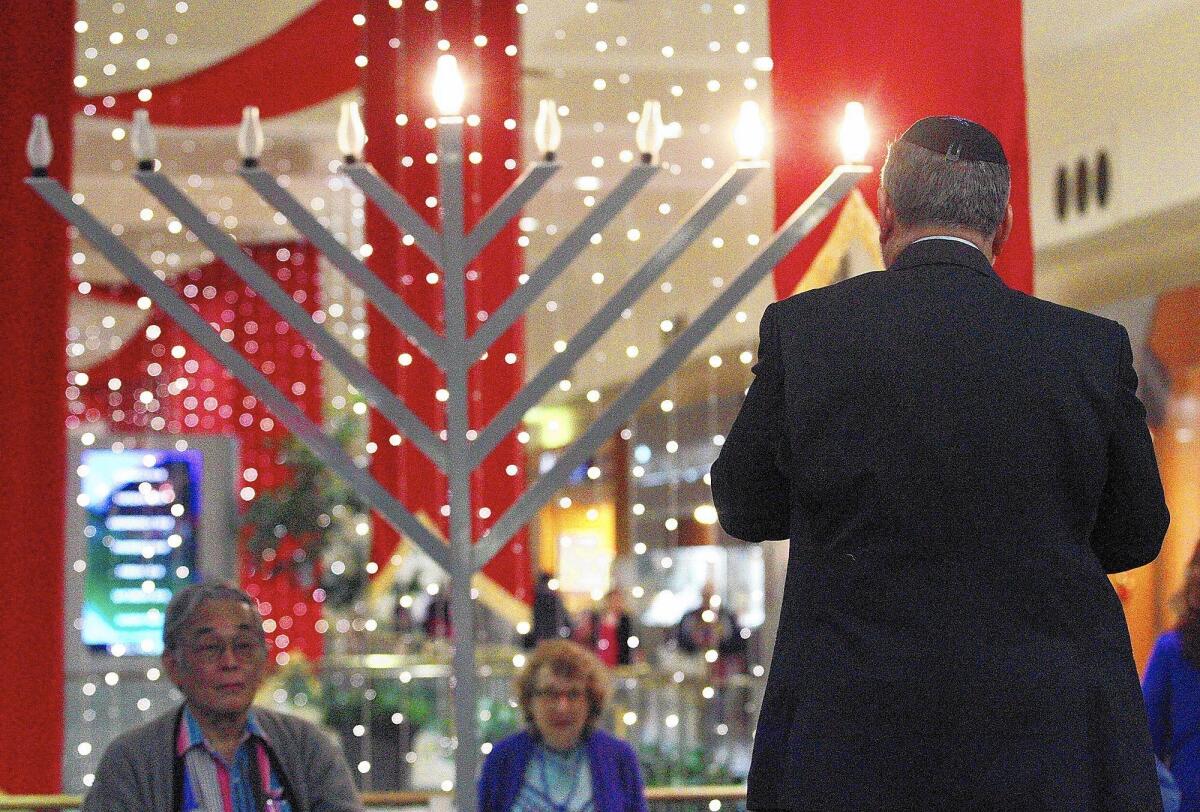Temple Beth Emet celebrates Hanukkah with public menorah-lighting at Burbank Town Center

Rabbi Mark Sobel addresses the audience at Temple Beth Emet’s public menorah-lighting ceremony at the Burbank Town Center on Monday, Dec. 7, 2015. The second light of the menorah was lit that night and will run until sunset Monday.
- Share via
This week, members of Temple Beth Emet in Burbank, like followers of Judaism around the world, are lighting the menorah as they mark the eight days of Hanukkah. However, rather than pray over the lights each night in a synagogue or at home, they are doing so on the third floor of the Burbank Town Center in front of Burlington Coat Factory.
Inspired by a 9/11 commemoration at the mall, the annual public menorah-lighting started four years ago as a way to bring the faith into the public, said Rabbi Mark Sobel, both to those who identify as Jewish and to those who don’t, but who might want to learn something about the Hebrew traditions.
“We want people to know who we are,” Sobel said. “We wanted to be visible.”
Temple members gathered at the mall to light the first branch of the menorah on Sunday, the first night of Hanukkah, and will be there each night this week with a different activity to engage the community.
Ira Goldstein, the temple’s president, said temple members don’t recruit or proselytize, but “we just welcome people — they’re people.” He said the members include those who have chosen Judaism, as well as those who were born into the faith, plus many families of mixed religious makeup.
On Monday, roughly a dozen people took part in the prayer in which they thanked God for miracles, followed by Sobel’s discussion of the importance of jelly doughnuts. Then they ate and shared dozens of the pastries.
Activities on Wedneday night will include games with the clay toy known as a dreidel and Thursday will be a sing-along with tunes like Tom Lehrer’s “Hanukkah in Santa Monica.” Saturday will include the showing of the animated movie “Lights,” about the deeper meaning of the holiday.
The holiday, which runs until sunset Monday, celebrates the rededication of the Holy Temple in Jerusalem, when it is sad that one day’s worth of sacred oil lasted for eight days.
The miracle, proclaimed in both the Jewish and Christian holy books, happened at the time when the Maccabees, leaders of a rebel Jewish army, revolted against the Greek Seleucid Empire more than 150 years before the time of Jesus. The Greeks had forbidden Jewish religious practices, and Sobel said Hanukkah also celebrates religious freedom through the ages.
Known as a sufganiot, the jelly doughnut is one of the deepest lessons of Hanukkah, Sobel said. It’s fried in oil, connecting it symbolically to the miraculously long-lasting Maccabean oil.
However, “the miracle wasn’t the oil,” Sobel said. It was that the Jewish militia defeated the Greek army. The jelly in the doughnut is a reminder of the sweetness of that victory, he said.
The latke, a fried potato pancake, may be more commonly associated with the holiday, Sobel said, because Eastern European Jews had plentiful potatoes from which to make them, and because it’s suitable food for the cold weather. However, he said, it’s too heavy for someplace like Israel or Southern California, with their Mediterranean climates.
It’s also unlikely that the Maccabees ate latke, Sobel said. If they had, they would not have achieved the miraculous victory because of the heavy food in their bellies, he said, jokingly.
“We’d be speaking Greek and worshipping idols,” he said. “After potato latke, you can’t go out and fight.”
Following the prayers, the women’s group from the temple supplied Krispy Kreme doughnut holes and helped people squirt a little jelly — strawberry, raspberry or boysenberry — into the golden nuggets’ centers. Sobel said the doughnuts have been a popular form of outreach to the community.
Cathy Zitnick, president of the group known as the sisterhood, said the treats tie into the holiday, but she also hoped they would be a sign of welcome to those who are not Jewish.
“Happy Hanukkah,” Zitnick said, offering the pastry to a woman walking by.
“No thanks,” the woman said, then relented. “OK, just one.”
